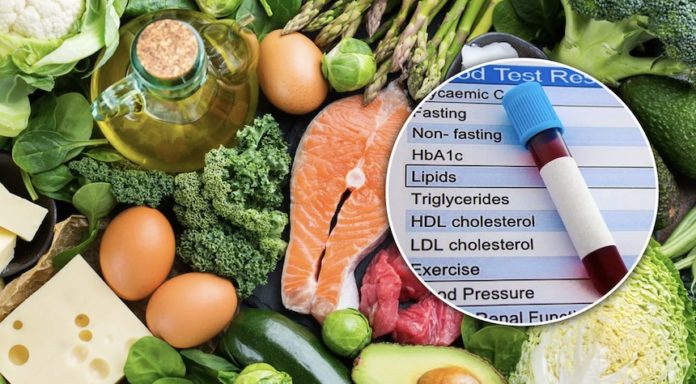In recent years, the low-carb ketogenic diet (keto) has seen a surge in popularity among people looking to lose weight.
However, a new study suggests that “keto-like” eating habits could cause a rise in “bad” cholesterol. This can increase the risk of cardiovascular events such as strokes, heart attacks, and plaque buildup.
The results of the study were presented at Sunday’s American College of Cardiology Annual Scientific Session together with the World Congress of Cardiology in New Orleans, Louisiana.
“Our study revealed that regular consumption of low-carbohydrate and high-fat diets were associated with higher levels of LDL cholesterol (or ‘bad’ cholesterol) and increased risk of developing heart disease,” Iulia Iatan M.D., Ph.D. in a press release.
Iatan is an attending physician-scientist at St. Paul’s Hospital, Healthy Heart Program Prevention Clinic, and the University of British Columbia’s Centre for Heart Lung Innovation, Vancouver, Canada.
She added that “to our knowledge, this study is the first to examine how dietary patterns affect cardiovascular outcomes.”
What Is The Keto Diet?
There are many variations of the ketogenic diet, but it generally contains very few carbs and less than 50g per day.
According to Harvard’s School of Public Health, the target ratio is typically 75-80% healthy fats and 10-20% protein, with 5-10% carbohydrate intake.

The body’s metabolic system will default to burning carbohydrates for energy.
The keto diet reduces carb intake so that the body looks for other sources of energy, such as fat.
The liver breaks down fat to create ketones, an alternative fuel source. This is how the keto diet got its name.
A keto-like diet doubles the risk of cardiac events
Researchers looked at data from people who followed a low-carb/high-fat (LCHF), diet that contained 25% or fewer carbs and more fat than 45%.
(This was not as low-carb as the keto diet. This is why it was called “keto-like.”)
They also looked at those who followed a more balanced, standard diet.
This data was retrieved from the UK Biobank database. It includes over 500,000 U.K. residents who have been monitored for at least a decade.
This study included 1,525 participants. 305 ate an LCHF and 1,220 ate a regular diet. Participants were all the same age, gender, and range in body mass.
Those who were on an LCHF diet were found to have markedly higher levels of LDL (“bad”) cholesterol and apolipoprotein B (apo B), a protein that attaches to LDL and can help measure the risk of heart disease.
According to the American College of Cardiology’s press release, “After an average of 11.8 years of follow-up and after adjustment for other risk factors for heart diseases such as diabetes and high blood pressure, obesity, smoking, and after adjustment for others such risk factors as diabetes, high cholesterol, obesity, and smoking, people on LCHF diets had a more than two times greater risk of experiencing several major cardiovascular events such as blockages of the arteries that required to be opened with stenting procedures and heart attack, stroke, and heart disease
An average of 9.8% of participants on the LCHF diet had a new heart event during the course of the study compared to 4.3% for those on a regular diet.
Kim Kulp, a San Francisco-based registered dietitian, was not surprised at the results.
She explained via email that “previous research has shown that an increase in saturated fat intake can increase levels LDL cholesterol (or the type of cholesterol that increases the risk of developing heart disease”) to Fox News Digital.
Saturated fat refers to the fat found in high amounts in foods such as butter, cheese, and fatty meats like bacon and sausage. The American Heart Association recommends that total fat intake be limited to not more than 35% of daily calories and that saturated fat should not exceed 7%.
Iatan stated that anyone who wants to eat low-carb should consult a doctor before starting a diet.
She said that patients should monitor their cholesterol levels while on the diet and also address other risk factors such as smoking, diabetes, high blood pressure, and physical inactivity.
Lindsay Allen, registered nutritionist and owner of Back in Balance Nutrition, LLC in Tampa Bay, Florida, wasn’t involved in the study. However, she warned that many people who follow a keto diet don’t balance their fats properly.
She stated that if you consume 60-80% of your calories from fat you need to ensure you get enough monounsaturated fats, and omega-3 fatty acids (specifically EPA, DHA, and fish) and not overdo saturated fats such as meat and cheese.
“Many people over-consume saturated oil without maintaining a healthy balance of all other fats. This can lead to high cholesterol.
Experts believe it is healthier to switch between the keto and long-term diets than to follow it for a while.
Allen stated that eating too few carbs over a long period of time can cause a decrease in antioxidants, phytonutrients, and fiber which are necessary to balance cholesterol levels.
There were some limitations to the study.
Some limitations were identified by the study authors.
Participants only reported their food intake through a questionnaire at one time. This could have an impact on accuracy.
Kulp of San Francisco stated that there may be many variations in the diets of subjects, as only one day’s worth of food choices were reported.
“Keto is not bad, but it isn’t for everyone.”
The authors also noted that this observational study showed only an association and not causation.
Allen stated that the keto diet is not necessarily bad as long as it is followed properly. He also said that the intake of fats should be balanced and that the diet should cycle to provide fiber and antioxidants.
“This study shows that the keto diet is not suitable for all people. It would be a wise idea to seek professional guidance to ensure you are a good candidate.”
Iatan stated that more research is needed to determine if keto-like diets are linked with heart health.




